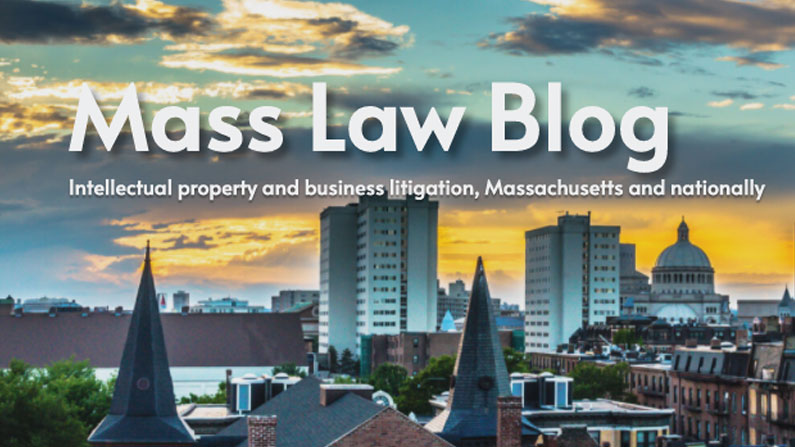
by Lee Gesmer | Nov 12, 2022 | General
Louis Agassiz thought that black and white races had different origins. In 1850 Agassiz – an eminent professor at Harvard – embarked on a tour of South Carolina plantations in search of racially “pure” Africans whom he could study as evidence to support this theory, known as “polygenism.”
On the trip Agassiz commissioned a photographer to take daguerreotypes of Renty Taylor and his daughter Delia, two slaves who lived on a South Carolina plantation.
The images – believed to be the earliest photos of American slaves – disappeared into the archives of Harvard’s Peabody Museum for over a hundred years, only to be discovered by a museum employee in the 1970s and widely publicized by Harvard.
In 2011 Tamara Lanier learned she was a descendant of Renty and Delia and became aware of the daguerreotypes. She wrote to then-Harvard President Drew Faust and asked that Harvard give these family artifacts to her. To make a long story short, Harvard declined. In the words of the Massachusetts Supreme Judicial Court (SJC) Harvard was “dismissive” and “disrespectful” when it wasn’t ignoring her altogether.
Represented by celebrity civil rights lawyer Ben Crump and others Lanier sued Harvard. She didn’t want money – she wanted Harvard to give her the daguerreotypes.
Lanier’s claim had nothing to do with the images, which are unprotected by any copyright. Lanier asserted a property right. She wanted the physical daguerreotypes – the copper plates – that were created in 1850 and which Harvard had retained for almost 175 years.

Renty Taylor
Harvard refused and Lanier sued. Lanier’s suit contained a variety of legal claims, but the central claim was for “replevin.” Replevin is a legal right that has a thousand year history in British and U.S. law. Replevin enables someone to regain possession of property that belongs to them. If you steal my bicycle and refuse to return it I could go to court and file an action for replevin to force you to hand it over. This is what Lanier wanted – to force Harvard to give her the physical media that held the images of her ancestors.
Her suit failed, although the court did throw her a bone – it held that Louis Agassiz’s actions in 1850, and Harvard behavior toward Ms. Lanier post-2011, were plausibly extreme and outrageous, and therefore might support claims of intentional and reckless infliction of emotional distress. The case could proceed to trial on these theories.
However, these claims appear to be little more than an afterthought – they aren’t mentioned in the appellate briefs or oral argument before the SJC. While Ms. Lanier is pursuing them post-appeal they are unlikely to yield much in the way of money, and they won’t give her the relief she was seeking.

Delia Taylor
Why did the SJC deny her property claim? The SJC’s decision in this case is a remarkable deep dive into the history of slavery and racism in 19th Century America. The Harvard professor, Louis Agassiz, was not an obscure academic – he was a giant in the study of natural history, and geology. Until not long ago a neighborhood in Cambridge, Massachusetts where he had lived was known as “Agassiz.” Reading the legal filings and the SJC decision is as much a historical journey through American slavery and a moral crusade as a legal argument. The central message is that Harvard committed a terrible wrong to Renty and Delia in 1850, and that Harvard’s refusal to give his ancestors the daguerreotypes is a continuation of that wrong. In essence, Lanier asked Harvard to do the right thing and give the plates to her. When Harvard refused to do so Lanier’s lawyers asked the courts to force Harvard to compel Harvard to do the right thing.
Lanier’s arguments failed before the SJC. The court held that Lanier was unable to satisfy the strict requirements of replevin because she had no property interest in the plates. Under well-established law the photographer (or in this case the commissioning party, Harvard) owns the negatives from a photograph. The court declined to make “new law” that would give her possession of the plates. And, in any event, her claim was barred by the statute of limitations.
One of the seven SJC justices – Associate Justice Elspeth Cypher – wrote separately and argued for a new common-law cause of action. In a concurring opinion she argued that the common law may be used to remedy any injustice. While she cited many case decisions that support this proposition, the most powerful statement came from former SJC Chief Justice Ralph Gants:
“We are responsible [for] and the sole arbiter of the common law of Massachusetts. The common law of Massachusetts is ours. We are responsible for it. . . . probably the single most important thing … is that it is our obligation to correct miscarriages of justice. . . . we don’t walk away from miscarriages of justice. We don’t generally say, `well, we rely upon the importance of continuity, so if it was an injustice that occurred a while ago, we’re just going to leave it be.’ Our obligation is to correct a miscarriage of justice whenever it happens, and that is part of what is bred in our bone.”
R.D. Gants, C.J., Welcome Remarks (Aug. 31, 2020).
Tragically, Justice Gants passed away suddenly in 2020, just a month after making these remarks, so he had no voice in the SJC’s Lanier decision.
Justice Cypher proposed an extraordinarily narrow legal legal test to resolve this case – a test that might provide justice to Ms. Lanier and likely never be applied again:
“a plaintiff must show that (1) she is a direct lineal descendant of a specific individual or individuals enslaved in the United States or in a colony that later became a part of the United States; (2) the defendant has possession of an artifact, which was created or obtained as a consequence of the enslavement of the plaintiff’s ancestors; (3) the defendant participated, either directly or indirectly, in the wrongful creation or attainment of such artifact; (4) the artifact provides a meaningful connection between the plaintiff and her ancestors; and (5) the plaintiff has made a request or demand to the defendant to relinquish the artifact to the plaintiff, which the defendant has refused or ignored. On establishment of the foregoing elements, as the sole remedy for this cause of action, the plaintiff would be entitled to the specific performance of transfer of possession of the artifact from the defendant to the plaintiff.”
The majority of the Court rejected this test, arguing that –
“we can identify no support in the common law of this Commonwealth or any other State for the new cause of action that Justice Cypher’s concurrence would create to allow descendants of persons who were enslaved to obtain possession of artifacts that resulted from the enslavement of their ancestors. . . . the new right proposed in Justice Cypher’s concurrence does not derive from common-law reasoning, which is a precedent-based, evolutionary decision-making process providing both for continuity and change. Rather, a right and remedy, without precedent, would be created anew.”
As best I can determine, Ms. Lanier has no further legal recourse. There are no federal constitutional or statutory issues in the case, so she has no right of appeal to the U.S. Supreme Court. Unless Harvard has a change of heart, Harvard will maintain possession of the daguerreotypes of Renty and Delia Taylor in perpetuity.
Lanier v. President and Fellows of Harvard College, 490 Mass. 37 (2022)
Oral Argument Video

by Lee Gesmer | Nov 9, 2021 | General
Many people who’ve lived with the traditional rules of intellectual property during their professional lives are struggling with non-fungible tokens, or “NFTs”. I’m one, and it’s a bit of an existential crisis for us. My advice – relax and repeat after me: “this has nothing to do with copyright law.”
The existence of NFTs came to the attention of many people after Christie’s sold Beeple’s Everydays: the First 5000 Days – a collage of 5000 digital art images – for $69 million in early 2021. One of the 5000 images is at the top of this post. The purchaser was Vignesh Sundaresan, and to be precise, Sundaresan purchased this NFT in exchange for $69 million worth of Ether cryptocurrency.
What, I asked when I first heard this, did the buyer receive in exchange? I assumed the buyer received copyright title in the artwork. Or perhaps a license to the work. This was a copyright transaction involving digital art, right? Old wine in new bottles.
Wrong!
Although the subject matter of the Beeple NFT appeared to fall in the realm of copyright law – digital artwork – Mr. Sundaresan received none of these things, nor anything else that one would associate with copyright law.
Warning, blockchain jargon ahead: Mr. Sundaresan received a unique (hence “non-fungible”) crypto “token” – not to be confused with non-unique (hence “fungible”) cryptocurrencies like Bitcoin and Ethereum that can be traded on a blockchain. His purchase of this NFT was subject to a “smart contract” that you can read here (2,000+ lines of code, good luck). The token is managed (recorded, bought/sold) on a public blockchain, a decentralized, peer-to-peer network-based digital ledger system that tracks the ownership of the NFT. The token contains a link to a location on the Internet that holds a copy of the digital artwork, but there was no transfer of ownership of the artwork. Christie’s terms of sale made this clear to potential purchasers.

Beeple’s Everydays: the First 5000 Days
Let me stop now and note that, based on my reading on the subject, there’s a lot of confusion around NFTs, even among the Internet 3.0 cognoscenti. A photo or musical work created today is under copyright, and the owner (often the author, particularly in the world of NFTs) can control reproduction and public display/performance. In the world of traditional copyright transactions a buyer owns the physical copy s/he purchases. If there’s only one copy, or a limited series, the original may increase in value – this is why people invest in art.
By contrast the buyer of an NFT rarely (if ever) acquires ownership of the art work. And here we see the copyright conundrum – historically, no knowledgeable art investor would spend a large sum of money to buy a piece of digital art to which they didn’t own the copyright or a physical copy, and which could be reproduced and downloaded off the Internet with the right-click of a mouse.
This is the “legal” aspect of NFTs that leaves intellectual property lawyers perplexed – in many instances the seller of the NFT makes no promises, other than not to resell the specific NFT purchased by the buyer. The buyer owns nothing more than a fragment of code that exists on a blockchain, and a link to a website that holds an authentic copy (one hopes) of the artwork.
The point is this: in the world of NFTs – which typically involve artwork, video and music – purchasers of NFTs do not obtain any intellectual property ownership in the work associated with the NFT unless it is explicitly transferred. In the case of Beeple’s artwork, the buyer didn’t purchase the artwork and he didn’t purchase the copyrights – the buyer purchased the token, and the right to hold or resell it. The images in Beeple’s $69 million collage are all freely available on his website.
Now, lawyers, wake up! There’s good news for you. NFTs may be subject to “smart contracts.” What is a smart contract? It’s a computer program executed in the blockchain by algorithmic code when given certain data. You can see the Beeple contract linked above (the MakersTokenV2 standard), and another example here (the ERC721 standard). If you have the courage to click through you’ll see that these so-called “contracts” look nothing like traditional contracts – they are computer code.
However, with smart contracts traditional legal principles have infiltrated the world of NFTs – at least to the extent that a court can “translate” and enforce a code-based contract. The buyer and seller of the NFT can agree to copyright-like rights, either on the blockchain or even in a traditional “off-blockchain” natural language contract. They could also agree, for example, that if the token is resold a percentage of the resale price would be paid to the NFT creator, or some other third party (perhaps a charity). The smart contract would cause this to occur automatically and the designated recipient would receive payment in crypto currency without any human intervention.
So, to return to my original point – at first this is all a bit mind boggling to people steeped in traditional copyright law, but not so much if you understand that NFTs often involve works that could be the subject of traditional copyright transactions, but aren’t.
If you’ve been paying attention and think you’ve understood everything I’ve said, you may still feel confused. Don’t feel badly, almost everyone else is too. If you’d like to read further on this topic I recommend Deconstructing that $69million NFT (explaining what an NFT is, in technical detail) and the October 26, 2020 episode of the 4PC Podcast, which explains some of the legal issues involved with smart contracts.
If you still aren’t sure what an NFT is, or why people are willing to pay huge sums of money for them, I’ll leave you with copyright lawyer Rebecca Tushnet’s explanation. When asked to explain the value of a NFT she responded –
The value is the ability to say that you own the NFT. Like blockchain currency, it is worth whatever humanity collectively or individually decides it’s worth. It is a melding of Oscar Wilde and Andy Warhol, art for art’s sake and commerce for commerce’s sake.
by Lee Gesmer | Jun 4, 2021 | General
In my first two posts on arbitration (here and here), I told a couple of war stories about what goes on behind the scenes in arbitration – what I called the “sausage factory.” To close this series, here are some general observations on arbitration.
Should I include an arbitration clause in a contract?
This can be a difficult question, with pros and cons on either side, and no obvious answer. And, since arbitration is typically in the “boilerplate” section of a contract it often receives little attention during a negotiation. This can be made worse if the lawyer guiding a client is a contracts or corporate lawyer that has had little or no personal experience with arbitration, which is often the case.
Pros of Arbitration
It Can Be Fast and Private. The key factor favoring arbitration is speed. It’s faster, almost always faster than a court case, which can take years to go to trial and can then be appealed by the losing party, stretching the process out even further. In Massachusetts it can take three years or more for a case to go to trial in state court. Add another year for appeal.
These delays can drive litigants crazy, and arbitration short-circuits this. It’s also private (if the agreement stipulates this), which can be appealing to a business that may be concerned about having its reputation harmed by public court proceedings.
Cons of Arbitration
However, when weighing the desire for a speedy resolution you need to take a few things into consideration.
It Can Be Expensive. Arbitrators are almost always lawyers, and you are paying for the arbitrator’s time, usually at his or her hourly rate. The parties split the cost, but it still has the potential to be more expensive than state or federal court. And where there is a panel of three arbitrators (as was the case in the two war stories I told in previous posts), the parties are paying three hourly rates. Assume $450/hour (a reasonable estimate in Massachusetts) and one hour of hearings, deliberations or phone conferences to discuss a procedural matter or discovery dispute will cost the parties $1,350.
In my experience, on three-person panels all of the arbitrators weigh in on everything that comes up in the case, no matter how minor. This includes scheduling orders, discovery disputes and any other minor issue. The parties have no control over this.
The American Arbitration Association (AAA) asks each arbitrator to estimate their fees at the beginning of each case, and arbitrators tend to overestimate their fees – better to overestimate and surprise on the downside than the opposite. However, this can result in a large upfront bill to the parties, who can’t be confident that they’ll get a refund at the end of the case.
Add to this fees of the company administering the arbitration, such as the AAA, and the expense is even higher.
I had a case last year in which an individual filed arbitration against a well-financed corporation. The case called for a three-person panel and senior, expensive (the other two, not me) arbitrators were appointed. It was obvious that the individual plaintiff would have a difficult time paying a three-person panel in a complex business dispute that would involve discovery disputes, thorny legal issues, dispositive motions and what was expected to be a five day hearing. Indeed, the case settled early on. I suspect that the anticipated arbitration costs were a factor in that settlement.
A court case, by contrast, costs nothing more than the filing fee.
Arbitrators are Not Bound to Follow the Law. How many people or companies, when negotiating an agreement that contains an arbitration clause, are told by their contract lawyers that in the event of a dispute an arbitrator can pretty much disregard the law and the facts, and that you have no right of appeal? Very few, I suspect.
Under the law of Massachusetts and under federal law, an arbitrator cannot be reversed by a court for failing to follow the law. The only possible exception to this is the so-called “manifest disregard” doctrine – an arbitrator may be reversed by a court when she decides a case in “manifest disregard” of the law.
However, this is a controversial doctrine which has been repudiated in some states and federal circuits. In any event it is difficult to establish that an arbitrator has acted with “manifest disregard” of the law. Cases reversing an arbitration award based on “manifest disregard” are exceedingly rare, and usually are accompanied by some form of overt misbehavior by the arbitrator.
The bottom line: if you elect arbitration you are pretty much at the mercy of the arbitrator with no right of appeal.
Where Does This Leave the Decision of Arbitration or Court?
In earlier posts I told a couple of war stories where, arguably, arbitrators acted improperly. But it’s my experience that the vast majority of arbitrators act properly and do everything they can to decide a case within the law and the facts. That said, you can never fully discount the risk that you’ll get an arbitrator who harbors a hidden bias or who may disregard the law.
Therefore, I would advise choosing a 3-person panel over a single arbitrator if you (or the party you’re representing or advising), can handle the additional cost — the 3-person panel reduces the power of a renegade arbitrator of the sort that I described in my second “war stories” post.
But I would never recommend a 3-person panel in which one arbitrator is neutral and the other two are retained by (and beholden to) the parties, as described in my first war story post. The attorneys for the parties can argue the case, and they don’t need “insider” arbitrators to argue the case a second time.
Good luck!

by Lee Gesmer | Mar 4, 2020 | General
“Discourage litigation. Persuade your neighbors to compromise whenever you can. Point out to them how the nominal winner is often a real loser – in fees, expenses, and waste of time. As a peacemaker the lawyer has a superior opportunity of being a good man.” Abraham Lincoln.
Does your lawyer have emotional intelligence? Or if you’re a lawyer, do you?*
*Note: “Studies show that lawyers score high in intelligence but below average in emotional intelligence, and Ronda Muir, author of ‘Beyond Smart: Lawyering with Emotional Intelligence,’ says that plays a part in the public’s low opinion of them.” American Bar Association, October 2017
Listening to a couple of doctors on radio interviews talk about how important emotional intelligence is for the doctor-patient relationship got me thinking about emotional intelligence in the context of lawyering.
What is emotional intelligence (EQ)? Howard Gardener describes it this way –
Your EQ is the level of your ability to understand other people, what motivates them and how to work cooperatively with them,” says Howard Gardner, the influential Harvard theorist. Five major categories of emotional intelligence skills are recognized by researchers in this area.
He goes on to describe the five major factors, one of which is empathy:
The ability to recognize how people feel is important to success in your life and career. The more skillful you are at discerning the feelings behind others’ signals the better you can control the signals you send them. An empathetic person excels at s service orientation. Anticipating, recognizing and meeting clients’ needs.
All five factors described by Gardener are important (the others are self-awareness, self-regulation, motivation and social skills), but I’ll focus on empathy in this post, since it’s had the biggest impact in my legal practice.
To be honest, my awareness of empathy was slow to develop. When I first graduated law school my goal was to be a competent legal technician, my definition of a “good lawyer” at the time. That meant learning the law in my practice area, which was all-consuming for the first few years. But eventually my eyes began to open to the empathic needs of my clients. My experience with two clients in particular made me aware of this.
Clients 1 and 2 – What a Difference!
The first client dates back to when I was a young lawyer at a large Boston law firm. The firm took on a contingent fee personal injury case. It was a relatively small case, so they assigned it to me to handle through trial. The facts were simple enough – an employee fell on a flight of stairs that didn’t meet building code. The client, I’ll call her Client 1, fell and injured herself quite badly. We were seeking $150,000 in damages from the building owner. The defendant (represented by insurance company lawyers) offered us $35,000.
The case was scheduled to go to trial, and one of the trial practice books I was reading suggested a good practice was to expose clients to the courtroom before trial. The theory was that a courtroom is an unfamiliar environment (boy, is it ever!), and the client should be familiarized with it before trial.
I walked the client up to Suffolk Superior Court a few days before trial, on an afternoon when I knew our courtroom would be vacant. Client 1 walked into the courtroom, took one look around, and I could see the blood drain from her face. She turned to me and said, “settle the case for whatever you can get.” I settled for the $35,000 that was on the table.
Not many years later, in my own law practice, I represented a businessman who had a net worth of $20 million. This man – Client 2 – was sued in a complex breach of fiduciary duty case that threatened his entire net worth. You might think that this would be stressful for him (it was for me), but as near as I could tell, he slept like a baby and this risk didn’t phase him one bit. I gradually came to realize that this man had nerves of steel. We ended up settling that case on very favorable terms, in large part due to his emotional resilience.
These two cases showed me two client extremes, and for many years I’ve used them as mental markers to gauge where my clients fall on this continuum. Were they, like Client 1, terrified of the courtroom (and very likely the entire legal process), or were they unfazed and able to handle the risk of a major lawsuit, like Client 2?
How has this changed me? Well, in the first place I try to suss out a client’s risk tolerance as early as possible. I discuss the realities of a lawsuit and the stress it puts people under. Rather than ask clients about their fortitude head-on, I’ll tell them the stories of Client 1 and Client 2, so that they have specific examples. This often gets them thinking, and by comparing themselves to these two situations clients can examine their own feelings and, perhaps, share them with me.
Sometimes I share with them the Abraham Lincoln quote at the top of this post. If the client thinks that the other side is weak and will settle early, I dissuade them of this belief. I may share one of my favorite proverbs: “a feather that floats into a court of law on a gentle breeze may require two oxen to remove.” I’ll tell them that I have seen many lawsuits where my client thought the opposing party was financially weak and would settle early, but the case dragged on for years.
I describe a deposition and trial, and explain that they may be the target of an aggressive lawyer on the other side of the case. You’d think that, based on popular television, everyone would know this, but you’d be surprised how many people don’t. A lawsuit is a stressful experience, and a client shouldn’t have to wake up one morning halfway through the case with the sudden realization that a lawsuit is like an endless root canal.
If the client has a spouse, I try to make sure the spouse is aware of how stressful a lawsuit can be. Most clients will discuss their feelings with their spouse before they discuss them with their lawyer, and stress on a spouse can be a major factor in the client’s mental health. I recall one case in which the client refused to settle, even on the threat of divorce from his wife. In fact, the client’s wife did divorce him.
Why is all of this important? First, you may be able to save your client emotional suffering and legal fees. Client 1, in my example above, was on a contingent fee, but I certainly could have saved her emotional suffering as that lawsuit dragged on and finally headed to trial. I should have seen her fear, but as a young lawyer I was probably too focused on my own insecurities. Second, like it or not, the lawyer and her client are a team, and the lawyer needs to know how strong the other member of that team is. Are they going to fold, like Client 1? If so, it would be good to know this as early as possible, especially if the lawyer has taken the case on a contingent fee. After all, the client, not the lawyer, controls the decision to settle.
Often, I’ll find my self representing a group of individuals whose interests are aligned. For example, several partners or co-owners of a business. From the EQ perspective that multiplies the complexity of the representation, since each of the partners may have a different capacity to endure the stress and uncertainty of a lawsuit, and the partners are forced to work that out among themselves. Better that they do that sooner than later, and if I can help with that process, so much the better.
So, to clients involved in a lawsuit (or considering bringing one), ask your lawyer to explain the process to you in detail, with an eye toward your emotional reaction to the events she describes. And lawyers, developing the skill I describe here may save you both emotional and financial pain.

by Lee Gesmer | Nov 17, 2019 | General
Click here to access my Resources Page on Oracle v. Google, currently pending before the Supreme Court.

by Lee Gesmer | Jan 31, 2019 | General
This extraordinary software copyright case — Oracle v. Google — has been in the courts for eight years, and I’ve blogged about it almost every step of the way. After winning twice in district court and losing two appeals before the Federal Circuit the case is on appeal to the Supreme Court for the second time. In its petition to the Court Google’s “questions presented” are:
- Whether copyright protection extends to a software interface.
- Whether, as the jury found, Google’s use of a software interface in the context of creating a new computer program constitutes fair use.
The first question was the focus of the first trial and appeal by Oracle. Google asked the Supreme Court to decide this issue after losing the first appeal, but was rebuffed. The second question was the subject of the second trial, which Google won on a jury verdict and lost on Oracle’s appeal to the Federal Circuit.
To recap, Google need a mobile operating system for its smartphones, and wanted to use Java. After negotiations to license Java from Oracle were unsuccessful Google rewrote the programming language code for Java (the implementing code) to be compatible with Java. It called this Android. It was careful to do this without copying the code for the Java language or infringing Oracle’s copyright in this work.
However, Google did copy the Java “declaring code” or naming structure (basically function calls), in order to make Android more familiar and accessible to Java programmers.
In the first appeal in this case the Federal Circuit reversed a decision by the trial judge and held that the declaring code was copyright protected, and therefore Google had engaged in copyright infringement. However, this conclusion was subject to Google’s fair use defense, which the jury had hung on at the first trial. It therefore remanded the case to the district court for a second trial on fair use.
At the second trial the jury found that Google’s copying was protected by fair use. However, Oracle appealed to the Federal Circuit again, and the Federal Circuit found that Google’s copy of the declaring code was not protected by fair use. This decision was extremely controversial – it was the first time a federal appeals court has overruled a jury verdict on fair use.
With respect to the first question presented — whether copyright protection extends to a software interface — Google’s current appeal focuses on the First Circuit’s 1995 decision in Lotus v. Borland. In that case the First Circuit held that the menu command hierarchy in the Lotus 1-2-3 spreadsheet program was a “method of operation,” and therefore excluded from copyright protection under Section 102(b) of the Copyright Act.
That decision was the subject of an appeal to the Supreme Court. In 1996 the Court deadlocked 4-4, and as a consequence the First Circuit’s decision was affirmed. However, due to the 4-4 deadlock it became law only in the First Circuit, not nationally. Lotus was an important decision at the time, but it has remained an outlier – no other court has fully adopted the holding in Lotus v. Borland.
In seeking Supreme Court review Google argues that there is a circuit split, as follows:
. . . the courts of appeals are deeply divided on the appropriate standard for determining the circumstances under which a software interface is copyrightable … . At a minimum, the Federal Circuit’s standard directly conflicts with the standard adopted by the First and Sixth Circuits. The Court should grant review to resolve the conflict among the courts of appeals on this exceptionally important issue.
On the second question presented — whether Google’s use of a software interface in the context of creating a new computer program constitutes fair use — Google argues:
Because the jury returned a general verdict on fair use, the Federal Circuit correctly stated that it “must assume that the jury resolved all factual issues relating to the historical facts in favor of the verdict.” . . . But the Federal Circuit said one thing and did another: it reconsidered for itself a number of factual issues presented to the jury and resolved those issues in support of the conclusion that Google’s use was unfair as a matter of law. . . . To permit that approach would condone an unprecedented degree of appellate second guessing of factual determinations in fair-use cases. This Court’s intervention is urgently warranted to rectify the Federal Circuit’s profoundly flawed approach.
I’m going to predict that the Supreme Court will accept review of this case on at least one of the two issues presented by Google. This case is of real importance to the software industry, and there is a good chance the Supreme Court will recognize that, as it did when it accepted review of Lotus v. Borland 24 years ago.
However, there are two issues lurking beneath the surface that could impact the Court’s decision of whether to grant review. T’he first is the unusual procedural posture of the case. It came to the Federal Circuit because there were patent infringement claims at an earlier stage of the case. This required that any appeals — even an appeal of a non-patent issue — be directed to the Federal Circuit rather than to the Ninth Circuit Court of Appeals, where the case was tried. However, Federal Circuit decisions that come to it from other circuits and do not involve patent law do not become the law in those circuits for purposes of legal precedent. This means that courts in the Ninth Circuit are not bound by the Federal Circuit’s ruling in this case. This fact diminishes the impact of the “circuit split.” It’s a circuit split between the First Circuit (Lotus) and the Federal Circuit, which hears very few copyright cases, and a First Circuit/Federal Circuit “split” may be less significant than a First Circuit/Ninth Circuit split would have been.
The second issue is the position of the Solicitor General. When Google appealed the Federal Circuit’s first decision the Supreme Court requested the Solicitor General’s opinion on whether it should take the case. The Solicitor General advised against review at that time, noting that the case involved “substantial and important concerns” that should be addressed through the fair use doctrine. The fair use doctrine was the subject of the second trial, and it’s likely the Supreme Court will ask for the Solicitor General’s views again. The recommendation of the current Solicitor General’s office on the issues in this case will be an important factor in the Court’s decision whether to review the case.
These technicalities aside, this is a hugely important case for the U.S. software industry. We can only hope that that Supreme Court recognizes this, and decides to clarify the issues presented by the case.
Please.
First Update: In September 2019 the Solicitor General (representing the United States) filed a brief opposing a grant of certiorari by the Supreme Court. The Supreme Court has agreed with an SG recommendation to deny cert over 90% of the time (Comparing Cert Stage OSG Efforts Under Obama and Trump (link)), so things are not looking good for Google at the moment.
Second Update: The Supreme Court granted cert (review). See my resources page here: link
FOOTNOTES

by Lee Gesmer | Nov 28, 2018 | General, Trademark
The U.S. Supreme Court decides very few intellectual property cases. And, it accepts review of few cases from the First Circuit Court of Appeals in Boston (my circuit). So, when the Supreme Court accepts an IP case appealing a decision from the First Circuit, as it has now, I pay attention.
The case under appeal involves a narrow but important legal issue that is of interest to both the intellectual property licensing and bankruptcy communities. Here is a brief summary of what’s at issue.
The decision on appeal is Mission Product Holdings Inc. v. Tempnology LLC (1st Cir. January 12, 2018), and the issue is a mashup of trademark and bankruptcy law.
When a company files for protection under Chapter 11 of the Bankruptcy Code, the trustee or the debtor-in-possession (the “debtor”) may secure court approval to “reject” any executory contracts to which the debtor is a party. An example would be a distribution agreement for a specific term (say five years) that has not run its course. If the distributor goes into bankruptcy two years into the five year term it can “reject” the contract – it is no longer obligated to perform during the remaining years.
The debtor doesn’t get off completely free – it is left with a liability for a pre-petition breach of the contract. 11 U.S.C. § 365(g) (“[T]he rejection of an executory contract or unexpired lease of the debtor constitutes a breach of such contract or lease … immediately before the date of the filing of the petition….”). However, the other party to the contract has nothing more than an unsecured claim, and these are often worth little in bankruptcy proceedings.
There is an important exception to this rule, which leads to the issue in this case. When the rejected contract is one “under which the debtor is a licensor of a right to intellectual property,” the licensee may elect to “retain its rights … to such intellectual property,” in effect forcing the continuation of the license. 11 U.S.C. § 365(n)(1).
However, the exception presents a potential problem for licensees in one respect – the definition of “intellectual property” includes patents, trade secrets and copyrights, but does not mention trademarks, a form of intellectual property that is often the subject of license agreements. 11 USC § 101(35)(A)
The First Circuit case involved an ongoing (“executory”) trademark license, and the debtor took the position that because trademarks are not included in the list of exceptions, it was entitled to reject (terminate) a trademark license. The licensee, the other party in the case, took the opposite position, asserting that the trademark license should continue.
The licensee lost before the bankruptcy court and appealed to the First Circuit. After a review of the statutory history of the law and the policy issues involved, the First Circuit held that Congress meant what it said by omitting trademarks from the list of the kinds of intellectual property that cannot be rejected by a Chapter 11 debtor – executory trademark licenses are an exception to the exception, and they can be rejected by a debtor. Therefore, the licensee lost its ongoing trademark license.
However, this ruling set up a “circuit conflict” with the Court of Appeals for the Seventh Circuit. For reasons too detailed to go into here, in Sunbeam Products, Inc. v. Chicago American Manufacturing, LLC (7th Cir. 2012), the Seventh Circuit held that Chapter 11 bankruptcy does not entitle the debtor to terminate a trademark license.
This conflict between the First and Seventh Circuits led the Supreme Court to accept an appeal of this case. And, this is clearly a case worthy of Supreme Court review. Prospective licensees should know whether or not they will be able to continue to use a trademark if the licensor files for bankruptcy, not that it depends on where in the country the bankruptcy is filed and therefore which circuit’s law is controlling. A decision by the Court will resolve, nationwide, the status of trademark rights when a debtor rejects a license agreement in bankruptcy.
Briefing on this case has not yet begun, but the case is likely to be heard next year, and a decision issued before the Supreme Court 2018-19 term ends next June. I’ll update this post when a decision is issued. In the meantime, here is a link to the Scotusblog page for the case.
Update, May 2019: The Supreme Court ruled that a debtor may not terminate a trademark license. Link to decision.
FOOTNOTES

by Lee Gesmer | Feb 17, 2016 | General
I’m not a constitutional law expert, but I can’t help but picture this scenario.
The senate refuses to schedule confirmation hearings for an Obama Supreme Court nominee. Obama does the natural thing – he sues the Senate Republican leader, Mitch McConnell, to compel him to hold hearings. The case quickly reaches the U.S. Court of Appeals for the District of Columbia, which rules one way or the other. The case is appealed to the Supreme Court, which ties 4-4 along conservative/liberal lines. As a result of the 4-4 tie, the D.C. circuit’s ruling stands.
You never know ….
by Lee Gesmer | Sep 21, 2015 | General
Lawyers can cross examine experts by questioning them with a “learned treatise” – what a non-lawyer might describe as an authoritative book or article written by an expert in the field. For example, if a doctor is testifying at trial in a medical malpractice case, her opinion on the proper standard of medical care can be challenged, on cross examination, by showing her a “learned treatise” that conflicts with her testimony. The jury hears the quote from the book, and can take it into consideration in evaluating the weight it may give to the expert’s testimony.
This is what happened in Kace v. Liang, a wrongful death medical malpractice case. In this case the doctor-defendant was testifying. He was shown pages from the web sites of Johns Hopkins University School of Medicine and Mayo Clinic that impeached his testimony, and at the request of the attorney questioning him, he read them to the jury.
On appeal the defendant argued that the web pages did not satisfy the strict requirements associated with learned treatises under Massachusetts law, and the Massachusetts Supreme Judicial Court agreed, stating that
The content of the web pages indicates that they are not medical ‘treatises’ of any sort intended to be read and used by physicians, but rather are directed at laypersons. . . . To establish the admissibility of the statements taken from the Johns Hopkins and Mayo Clinic Web sites, the plaintiff’s counsel was obligated to show that the author or authors of the web pages was or were “a reliable authority.” . . . The credibility of Johns Hopkins and Mayo Clinic as highly respected medical institutions or facilities is not enough to demonstrate the reliability of statements on individual pages of each institution’s Web site. There is nothing to say who wrote each Web page, or whether the author of each Web page was an appropriate source of information … .
This is not to say that material on a website may never be used as a learned treatise on cross examination. As the Court noted, it is up to the party seeking to use the material to establish that it was authored by a “reliable authority,” something the plaintiff had been unable to do in this case.
Despite this holding, the Court upheld a 2.9 million dollar jury verdict in favor of the plaintiff, holding that this, and several other errors, did not result in undue prejudice to the defendant.
Kace v. Liang (Mass. Supreme Judicial Court, Sept. 10, 2015)
by Lee Gesmer | Mar 18, 2015 | General
Stephen Lyons, a friend and attorney at Klieman & Lyons, asked me to guest-lecture the Law & Technology class he is teaching at MIT this semester. I only had one class period, so I decided to focus on the 2014 Supreme Court Aereo case. Although the slides are not “stand-alone” they are somewhat self-explanatory. I am sharing them below.
MIT Copyright Seminar 3-13-2015 (Reduced File Size) by gesmer
by Lee Gesmer | Mar 21, 2014 | General
- 9th Circuit holds copyright registration of a collective work registers the component works within it. Alaska Stock v. Houghton Mifflin (link)
- The PTO held its first Public Meeting on the Establishment of a Multistakeholder Forum on Improving the Operation of the Notice and Takedown System Under the DMCA (link)
- Long-running DMCA copyright suit settles. Viacom v. Youtube (press release) (blog post)
- Parties settle remaining issues in Prince v. Cariou copyright fair use case (blog post)
- Columbia Law Prof. Jane Ginsburg’s article on EU linking decision, Hyperlinking and Infringement: The CJEU Decides (sort of) (link)
- Prof. Eric Goldman’s post on Gardner v. CafePress (copyright/DMCA case; link to case in post) (link)
- Sup. Ct. Cal., County of San Francisco, holds that Instagram’s unilateral change of terms of service is enforceable (link)
- Michael Robertson, founder of MP3Tunes, found liable for copyright infringement in SDNY trial (link)
by Lee Gesmer | Jan 17, 2014 | General, Weekly Updates
- Massachusetts district court judge O’Toole denied a motion to dismiss copyright claims based in part on foreign publication, where plaintiff asserts that the foreign conduct stems from a domestic infringement (the “predicate act doctrine“). Palmer/Kane LLC v. Houghton Mifflin Harcourt Publishing LLC
- D.C. Circuit opinion in Verizon v. Federal Communications Commission, holding that the FCC doesn’t have the authority to impose net neutrality laws on companies
- An interesting article in PetaPixel, discussing Getty Images and Agence France Presse’s motion to set aside a $1.2 million verdict obtained by Haitian photographer Daniel Morel for copyright infringement of Morel’s images of the aftermath of Haiti’s 2010 earthquake
- Dow Jones has filed a “hot news” lawsuit against Ransquawk. Techdirt has the cease and desist letter and complaint here
- The House Committee on the Judiciary continues its hearings on possible copyright reform, based on technological developments. The focus this week was on the “making available” right. Video available here. David Nimmer written statement here. A full witness list (and access to all written statements), here. For an overview on these hearings see this Techdirt article, written last May.
- The Future of Music Coalition has created a timeline of the House Committee copyright reform process through January 14, 2014. Coming up: fair use and DMCA notice and takedown
- On January 17th the American Enterprise Institute Center for Internet Communications and Technology Policy held a program titled “Tech Policy 2014: The Year Ahead.” A video broadcast of the program is available here.
- Copyright and Industrial Design Developments – 2013, by Glen Bloom and Barry Sookman and focusing on Canadian law, is available here.
- Foss Patents predicts outcome in pending CAFC appeal in Oracle v. Google API copyright case (“it’s practically inconceivable that the district court’s non-copyrightability holding will be upheld”).










